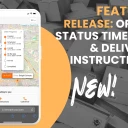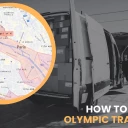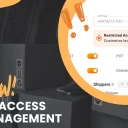Key Strategies to Scale a Tow Truck Business
Updated on
March 22, 2024
by
Mike Foster
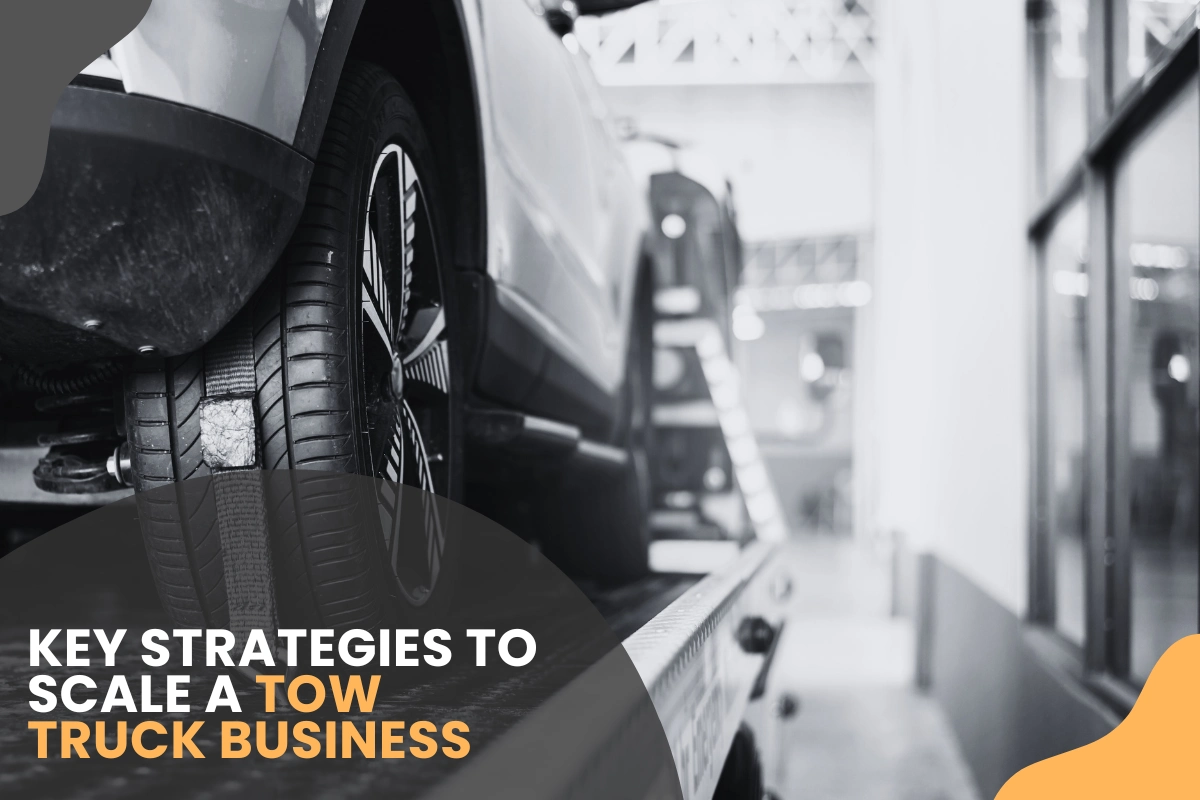
As long as cars are on the road, there will always be a need for tow trucks. Tow trucks play an essential part in traffic management by removing broken-down vehicles or vehicles that have been in accidents, restoring traffic flow, and supporting people in distress. They can be employed by traffic departments to remove abandoned vehicles or vehicles that are violating traffic laws.
Today’s vehicles are much more reliable than in the past; however, there is a contingent of aging vehicles that need attention from time to time, and besides this, the number of cars on the road continues to grow. Technological advances have meant an increase in e-commerce, which has boosted the logistics and courier industries. This means more road congestion, cars overheating in traffic jams, and more breakdowns.
According to statistics published by Maximize Market Research (MMR), the tow truck industry in the US is set to grow at a compound annual growth rate (CAGR) of 5.1 percent from 2024 to 2030. This is partially due to innovative technologies that have provided tow trucks with sophisticated communication tools that alert them to traffic problems, improve response times, and gain drivers' confidence in distress.
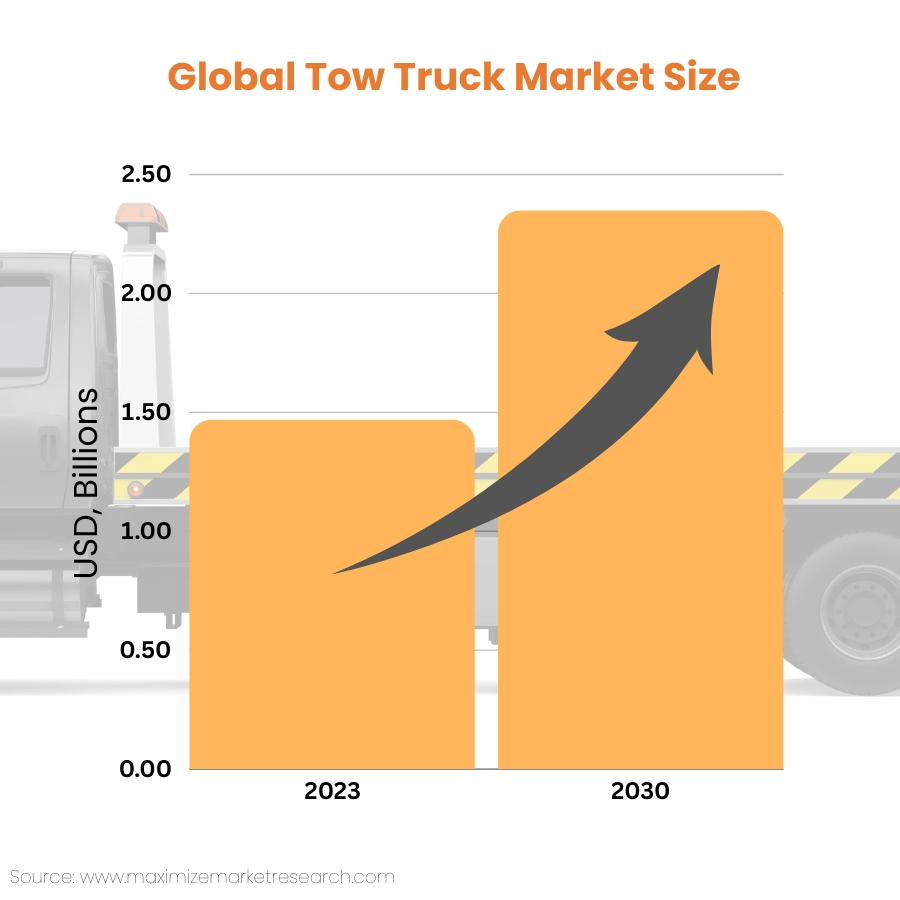
When you take all of this into account, you may be wondering how to start a tow truck business. It’s not as difficult as it may seem. As long as you can get the financing for your first towing vehicle and have a licence to drive it, you can build up a business from there.
Foundational steps for starting a towing business
Before starting a towing business, there are a few important items that require your attention.
The first step when starting any business is research. Find out what business models you can adopt to start a towing company, who your target market would be, what the industry growth looks like, who your competitors are, and how you can do it differently to make your business stand out.
Business models in the tow truck industry
There are many opportunities for tow truck businesses, besides roadside assistance and towing vehicles, that you might want to investigate. It’s worth researching whether you should specialize in one area of business or diversify if you have more than one vehicle.
You can operate independently or subcontract to a larger roadside rescue company. There are options to work for insurance companies, helping traffic departments that don’t have a dedicated vehicle and driver for towing illegally parked vehicles, assisting finance companies with vehicle repossessions, or doing long-haul transportation.
Sometimes, people will pay to transport their vehicle to a holiday destination if they don’t want to drive that distance themselves. Other private deals include helping someone get their car to a workshop for repairs or fixing a flat tire.
Business plan
The first step to starting a business is to draw up a comprehensive business plan.
This step is not negotiable, particularly if you need finance of any sort. Finance companies and tax regulators will want details of your business model and financial plans. Regardless of your monetary requirements, a business plan helps you to clarify any questions you may have and forces you to learn about compliance with tax and financial requirements.
Here is a link to a business plan template guide that will give you a good idea of how to start a towing company business plan.
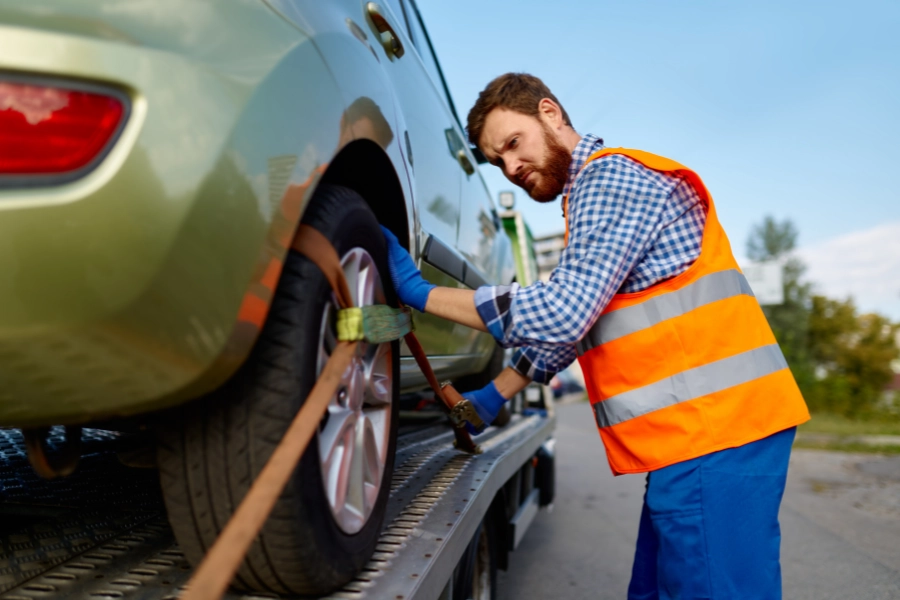
Insurance
Insurance is important here, particularly in terms of liability. Make sure you have public liability insurance and insurance on the vehicles you will be towing. In addition, you need to insure your tow truck for damages and ensure that you and your drivers have adequate medical insurance.
You may face indictment charges if you tow a vehicle without the owner’s permission. Investigate getting an indictment management permit to cover you for this charge.
Choosing the right tow truck
There are a few options that you can consider when you want to start a towing company. The size and weight capacity of the truck you buy will depend on what type of business you want to run, the terrain in your area, the size of the vehicles you plan on towing, and your budget.
Integrated tow trucks offer a range of functionality and can be used for towing vehicles, large rigs, buses, trucks, and motor homes.
With a strong metal yoke, wheel lift tow trucks lift the towed vehicle’s front or rear wheels off the ground. They offer a quick solution when it comes to removing immobile cars from an accident scene or towing away impounded vehicles.
Hook-and-chain tow trucks are practical and powerful, with a large hook and chain connected to the car. This method is, however, only sometimes safe and can result in stress and, ultimately, damage to the vehicle being towed.
Flatbed tow trucks are the most widely used towing vehicles and have multiple uses. They have a long metal bed with hydraulics that moves the bed into a position that allows a vehicle to be driven up the slope. Flatbed tow trucks are sturdy and suitable for long-distance driving as they can take various shapes and substantial weights.
Just because you choose one particular type of truck doesn’t mean that it isn’t versatile. Provided you aren’t overloading your tow truck, you will find that each car can be used for more than one purpose if needed.
Operational excellence in the towing business
When running a viable and profitable towing truck business, your vehicles, staff, and operational processes need to work together like a well-oiled machine.
If you’re fortunate enough to own a fleet of tow trucks, you will know that they too need regular servicing and maintenance. You cannot afford to have a breakdown while rescuing a customer in an accident or towing a vehicle on a busy highway.
In an environment where time is of the essence, the prompt arrival of an emergency vehicle, such as a tow truck, can make a difference when clearing the road and getting the injured parties to the hospital. Having your vehicles running in top condition can make that difference. You will also realize some savings in fuel and reduce the need for costly repairs if you keep your vehicles in good working order.
How does a paperless vehicle management system sound? One that will eliminate all the tedious inspection forms that keep your fleet management team busy for hours.
Various route planning software providers, such as Track-POD, also offer vehicle inspection functionalities that enable an easy-to-use digital solution that will help you keep your fleet of tow trucks in prime running condition, ensuring your staff's and customers' safety. The app provides scheduled walkaround checks, defect logging, and secure storage applications, all on a mobile device.
Getting vehicles to the scene of an accident or breakdown using the shortest and most efficient route also takes good driving skills and knowledge of the area, one-way streets, road works, etc.
Towing business owners usually ensure the drivers they employ have the necessary experience. Some employers prefer to give on-the-job lessons, and they will team new drivers up with someone who has experience until they have confidence in the new driver’s skills.
It’s obvious that efficient communication with drivers is key to getting a vehicle to the scene before the competition does. Large towing companies have dispatch officials who take calls and relay the information to drivers. Communication takes place utilizing smart phones or radios, using GPS technology to find the tow truck that is closest to the scene, and VOIP technology to communicate with the driver.
The dispatcher who takes the calls should be trained to listen carefully to the details and ask the right questions to ascertain what type of assistance is needed at the accident or breakdown scene. This information is relayed to the tow truck driver so that they know what to expect on arrival.
The dispatcher uses a GPS-enabled vehicle tracking system to follow the vehicle's progress, monitor the traffic en route, advise the driver of potential traffic issues, and keep the communication channels open for any assistance the driver may need.

For cases when operators are not responding to emergencies but rather follow a pre-planned route of orders to remove vehicles from specific locations, route planning technology may also come in handy. Such solutions empower businesses to ensure they follow the most optimal route, saving time, money, and fuel.
It's clear that using technology in these processes enhances the performance of vehicles, drivers, and support staff, making the operation run smoothly and providing the competitive edge you need to survive in this dynamic environment.
Regulatory compliance and licensing
Before starting your towing business, make sure you comply with all licensing regulations.
What license do I need to start a towing company?
Register your business. A limited liability company (LLC) or sole proprietorship is good for a start. Considering the risks involved with towing vehicles, limited liability is your best option, as your private assets will not be at risk if there is a large claim against the business. Do the homework before deciding, as it will be a costly exercise to change it later.
Do my tow truck drivers need special driver’s licenses?
Depending on the capacity of your tow trucks, you and your drivers may be able to get away with a standard driver’s license, but for heavy-duty driving, you will likely need a commercial driver’s license (CDL). Check with your local licensing department to find out what license is needed.
Operating license or towing permits
Towing permits or operator’s licenses may be required in your country or state and may depend on the size and type of tow truck. You must find out from your local traffic authorities or government department.
Being compliant from the start will give you peace of mind so that you can focus on getting your business up and running. However, be aware that rules and regulations change, and you are only sometimes updated when they do. Make it your business at least once a year to follow up on whether there have been any recent changes.
Marketing strategies for towing businesses
Your business model is in place, and your business and drivers’ licensing requirements are sorted out. And you have the trucks. Now it’s time to market your tow truck operation.
Word of mouth
The first step is to tell your family and friends about your business and start up a conversation with the man in the checkout queue. Network with people whenever you have the opportunity to do so.
Have a strong online presence
With the accessibility of the internet and social media, marketing today need not be expensive. Join local community groups online and write short articles about your tow business. By keeping an eye on these groups, you can volunteer your services when the community gets involved in projects such as helping out in disadvantaged communities or cleaning up the river banks in the area. It’s all about networking.
You can advertise on platforms such as Facebook and Google My Business; if you prefer, pay someone to do it for you. You may need to pay a small monthly fee to promote your ads, but it is relatively inexpensive, and you get excellent coverage by just sticking to the areas where you operate.
Having your own website is essential for referrals when someone wants to know more about your business. You should also pay someone to do a writeup that includes words that can be picked up by search engines (SEO) when people are looking for a tow truck service in your area.
You can describe what you do and create a gallery with pictures that display your premises and perhaps some testimonials from happy customers.
You also need to build up a reputation, and this is done by providing outstanding customer service. When a car breaks down, it usually causes a lot of stress in the lives of the people involved. Show empathy and consideration for what they are experiencing.
Before towing their vehicle away, ensure they can get home or find alternative transport. Be helpful at accident scenes by directing traffic around the affected vehicles, clearing up sharp bits in the road, or keeping bystanders out of the way while emergency personnel do their bit. Don’t compromise your safety or possible evidence, though—knowing the rules beforehand is good.
Help people at the side of the road who need tire changes or have run out of fuel. It’s unnecessary to charge for these small favors, as your reputation as ‘the helpful tow truck guy’ will exceed any marketing strategies you might be paying for.
Customer service and retention
Great customer service is essential in any business, and a towing business is no exception. Courteous and professional customer interaction should become second nature to anyone who is customer-facing.
As mentioned previously, when tow truck drivers come into contact with customers, it is usually under stressful circumstances, which means that the driver needs to be kind and helpful when dealing with these people. Driver training in this area should probably be done at regular intervals, not just to enhance their driving skills but to reinforce their responsibility to the safety and wellbeing of customers.
When engaging with a customer for the first time, first impressions count. Your drivers need to present a professional image in the way they handle the vehicle and in the way they treat the customer. If drivers need to give a quote on the accident scene, ensure they have professional tools to do so, and that their pricing structure is transparent to the customer. Any follow-up work in administration and communication should be handled effectively by your staff.
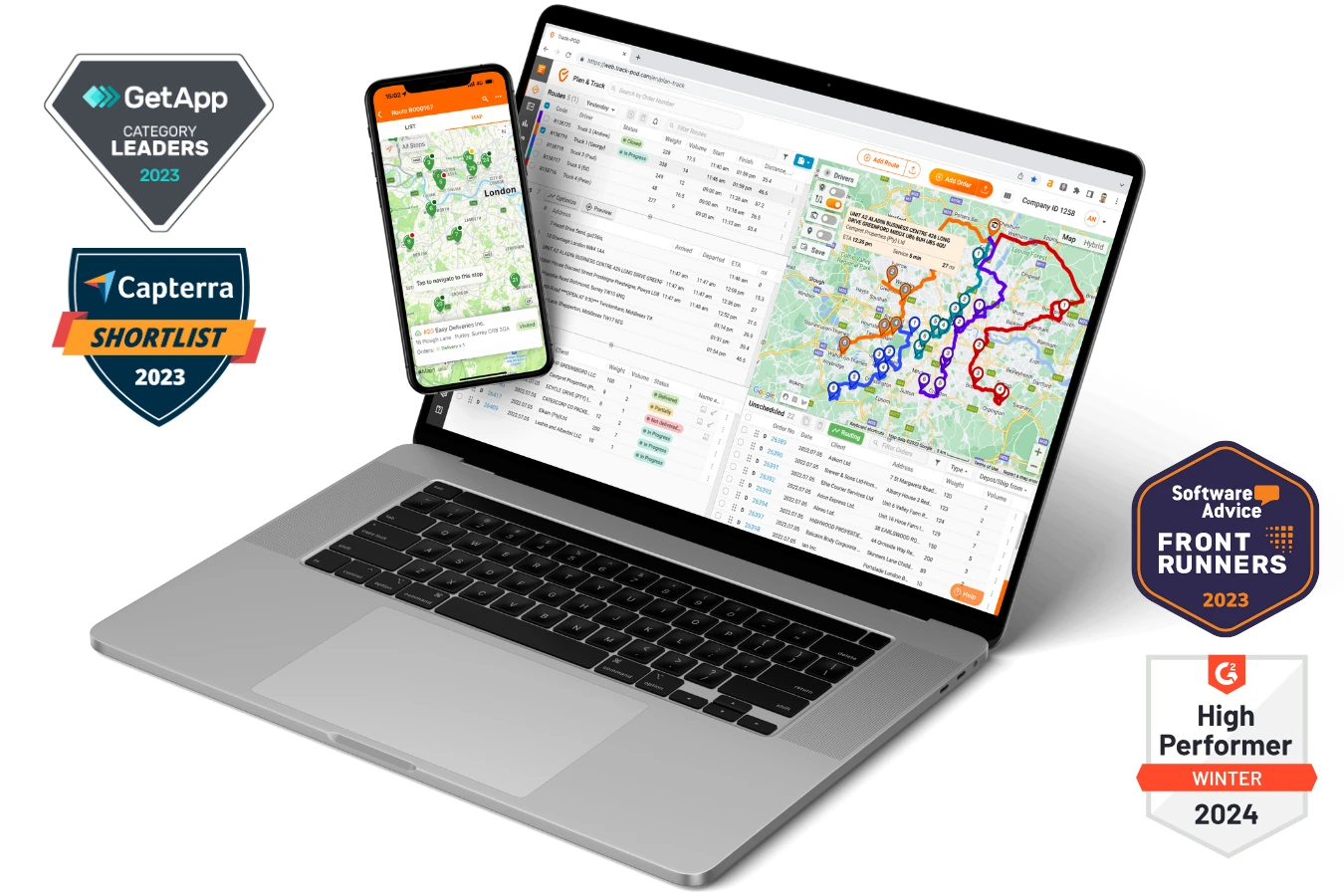
When you and your staff build trusting relationships with your customers, you are likely to retain their business and can look forward to repeat business from them sometime in the future.
Expansion strategies for a tow truck business
There are many ways in which a towing business manager or owner can generate additional work for your vehicles and drivers. Companies in vehicle hire, transportation, or insurance sometimes need the services of a tow truck to transport vehicles between two points or to fetch a broken-down or damaged vehicle out on the road.
Insurance companies are happy to pay to have repossessed vehicles relocated to auction sites, and traffic departments need assistance with removing cars if they do not have their own tow truck.
Approach car rental companies, insurance companies, and auto repair shops to see whether they might be prepared to sign a business agreement with you for future towing services.
An excellent way to start up a towing business would be to join up with one of the larger tow truck organizations, whereby you share the administration and call center resources but operate your own trucks. They will alert you to accidents and breakdowns and manage the communications and arrangements for the vehicle after that, while you will respond with your vehicle and do the towing.
When people have accidents, and their vehicle is towed to an auto repair shop, it doesn’t mean that the car will be fixed at that location, as insurance companies usually have their preferred auto repair companies that they deal with.
This is where you can secure a contract with insurance companies to transport damaged vehicles between the two auto repair shops.
Tow truck companies often build relationships with auto repair shops, whereby they recommend the auto repair shop to customers whose vehicles they are towing for a small fee. If you build a sound relationship with an auto repair shop, you may eventually get involved in that business and become a partner or even buy the business when the owner wants to sell it.
Once you are on your feet and have a steady work stream with a sound customer base, it may be time to expand your business. You should now have enough capital to afford an additional vehicle or two. You may want to go bigger and better, but if your truck's size is bringing in enough work, then perhaps it’s advisable to stick with what you know. Do the market research once more before you make a decision. You may be doing well, but is there still enough work out there for you to generate enough income to maintain an additional truck and pay another driver’s wages?.
A final word on scaling your tow truck business
To recap, you will need reliable, well-maintained vehicles, proper licensing and business registration, some training, a positive attitude, and a pleasant disposition. You must spread the word and network with people in your target area. Look out for opportunities and expand your business when the time is right.
Use technology as much as possible, giving you an edge over competitors. Clear communications, regular maintenance, and the ability to track your vehicles at all times can cost money to implement. Still, the outlay will be worth it as you manage your business in comfort, knowing that your trucks and drivers are taken care of and that you are projecting a professional image to your customers. Keep abreast of the changes and investigate before you dive into a technology revamp, but don’t miss out on innovation and change either, as this keeps you competitive.

